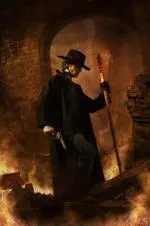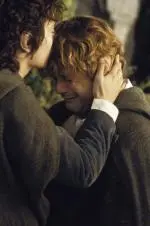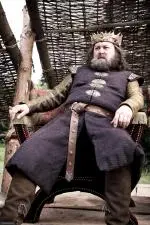[Father of the Year image via Sherri Osborn]
It’s a bit of a cheat, I must admit, to make this column about fantasy. Daddy issues have a long history of being a part of literature. They seem to be among the most common psychological motivators that characters in stories have. Star Wars, for example, is all about Luke’s relationship with his father. He first takes up his lightsaber in an effort to honor his father (and perhaps seek revenge). He then discovers that Darth Vader is his father, then he ultimately tries to redeem his father. And isn’t Star Wars really just a fantasy dressed up in SciFi clothes?
Why fathers and not mothers? I think part of this is because much of fantasy (though not all) tends to be male-dominated (or reflects male-dominated society). Male characters tend to have stronger associations with their fathers. This doesn’t mean that mothers aren’t equally important or represented (especially when you reference the evil stepmother trope). In the future I’d like to do a companion piece focusing on mother-child relationships, but for now, in honor of Father’s Day, we’re looking at the dads.
The Absentee Father
A father doesn’t have to be around in order to have an effect on his offspring. In the Star Wars example, Luke grows up believing that his father is dead. Even though Vader/Anakin casts a large shadow across Luke’s life, he has never known his father. The closest thing he has is Uncle Owen. In many fantasy stories, the absentee father is dead and their children are left with their mother or are else orphans. Other times the father has left, disappeared somehow, or else the child has cut him out of their life. Sandman Slim, from the series of the same name, has a father like this. In the beginning, we know that his father was a bad man who hated him and eventually left. But as you'll see with many of these examples, things are a bit more complicated than that. Without getting too much into spoilers, the subject of his parentage is later put into question, with potentially huge ramifications for Slim.
 In the same urban fantasy vein, Harry Dresden of The Dresden Files is an orphan. His mother died in childbirth and his father died when he was young. His father was the only parent that he ever knew and, while the absence of both his parents is important, he thinks often of his father’s love and kindness in the series. This absence leads Harry to finding some other father figures as you’ll see below.
In the same urban fantasy vein, Harry Dresden of The Dresden Files is an orphan. His mother died in childbirth and his father died when he was young. His father was the only parent that he ever knew and, while the absence of both his parents is important, he thinks often of his father’s love and kindness in the series. This absence leads Harry to finding some other father figures as you’ll see below.
Many of the traditional epic fantasy heroes are orphans as well. Garion of The Belgariad has his Aunt Pol, but his father and mother are dead (and he doesn’t know much about them). Seoman Snowlock of Tad William’s Memory, Sorrow, and Thorn is likewise an orphan. Rand al’Thor of the Wheel of Time is raised by others when his parents end up dead.
Fitz, of Robin Hobb’s Farseer trilogy is a bastard who finds out who his father is, but never really gets to spend any time with him before that father (Prince Chivalry) ends up dying. He ends up with other “father figures” but there’s not a lot of softness in those relationships.
King Oberon of the Chronicles of Amber also falls quite nicely into this category. Though he reigns in Amber the lives of most of his children, he doesn’t seem the kind of father who involved himself intimately in their lives. He seemed more concerned with the issues of the realm and finding his next wife. In fact, Oberon’s actual absence kicks off most of the events of the series. Indeed, if you imagine Oberon being more involved (and perhaps more clear about the issue of succession) a lot of the trouble that occurs in the books could have been avoided. We see Oberon’s parenting as filtered through his son Corwin’s POV, but later Corwin himself becomes an absent father (though not entirely by his own fault).
The Surrogate Sire
One solution to the Absentee Father is for the character to find a replacement, someone who takes on the father role, either literally or figuratively. Joseph Cambell’s Monomyth structure actually refers to the Atonement with the Father which can be literal or figurative, being in some cases a woman.
In some of the examples listed above, there are multiple father replacements. Justin DuMorne, for example, in The Dresden Files, ends up adopting Harry Dresden, but he’s a cruel and abusive father. Later, Harry studies under Ebenezar McCoy who becomes more of a nurturing father figure.
In the case of the eternal farmboy destined for greatness, the father figure usually takes the guise of the wise elder, whether that be Merlin from Arthurian legend or Allanon from the Shannara books, or Dumbeldore from Harry Potter, or Gandalf or Belgarath or Dallben from the Chronicles of Prydain. A cruder example is Doctor Adoulla Makhslood from Saladin Ahmed’s Throne of the Crescent Moon, who helps guide his young Dervish companion, Raseed bas Raseed.
Another possible substitute often comes from someone who was a companion or contemporary of one’s missing father. Harry Potter, for example, has Sirius Black, one of his father’s best friends. Fitz, of the Farseer Trilogy, is first given into the care of Burrich, his father, Prince Chivalry’s, right hand man.
The Doting Dad
The relationship between Bilbo and Frodo is an example of this. Sure, Bilbo isn’t Frodo’s father (he’s more of a cousin), but we never see Drogo in the books and Bilbo acts in a fatherly role to Frodo, essentially helping to raise him. It’s to Frodo that Bilbo leaves his most valuable possession (not to mention Bag End, much to the dismay of the Sackville-Bagginses). Bilbo’s quest quite literally becomes Frodo’s quest as if they were father and son.
 To stick with Tolkien, this also comes into play with the Theoden/Eowyn relationship. Theoden has his own son, Theomer, but he raises both Eowyn and her brother, Eomer, as his own. But it’s Eowyn who is closest to Theoden and her desire to avenge her beloved king is what brings down the Witch-King of Angmar, leader of the Nazgul whom no man can kill.
To stick with Tolkien, this also comes into play with the Theoden/Eowyn relationship. Theoden has his own son, Theomer, but he raises both Eowyn and her brother, Eomer, as his own. But it’s Eowyn who is closest to Theoden and her desire to avenge her beloved king is what brings down the Witch-King of Angmar, leader of the Nazgul whom no man can kill.
And then there’s Elrond and daughter Arwen. Arwen, in love with Aragorn, must choose to follow the Elves or become a mortal, the same choice that Luthien was once given. Elrond truly loves his daughter and doesn’t wish to see her fade, though ultimately he must leave her.
And then of course there’s Denethor and Boromir. I don’t think Denethor could have doted on his son more. Denethor loved Boromir "too much, perhaps; the more so because they were unlike." He certainly favored Boromir over his other son, Faramir (see below).
Aside from Tolkien, I couldn’t think of many examples of this except in A Song of Ice and Fire (see below). Feel free to come up with those I might have missed in the comments.
Perilous Pops
Some fathers are downright nasty, often opposing or even trying to kill their offspring. In such relationships the sons may try to please their father (most unsuccessfully) or they may actively work against them.
As mentioned, one of the most dysfunctional relationships between a father and son in The Lord of the Rings is the one between Denethor and Faramir, something that was highlighted even more in the movies. Faramir, despite being more like his father than Boromir, seems to continually disappoint his father. Denethor disliked Faramir’s closeness with Gandalf and later he’s angered that Faramir lets the Ring go. Faramir takes on overwhelming forces in an effort to obey his father and almost dies in the attempt. This culminates in Denethor almost burning his son alive and only the combined efforts of Gandalf and Pippin save him.
Another dicey father son relationship exists in the Dragonrealm series by Richard Knaak. The protagonist of the early books, Cabe Bedlam, a sorcerer, is the son of the mad wizard, Azran. Azran’s neglect almost causes the infant Cabe to die. He’s saved by his grandfather, Nathan Bedlam, who reverses the trope, though it makes Azran then into one of the...
Sinister Sons
The flipside to the previous category is when the father is generally good and the sons are villainous, also known as the Bad Seed. Look, for example, at Arthur and Modred. The Arthur legends are full of daddy issues. Arthur follows a very familiar path of not knowing his true father, Uther Pendragon, and being raised instead by someone else. Merlin serves in many ways as a father figure to him. Later, Arthur fathers Mordred (by his sister in many versions). Mordred is one of the true villains of the legends and typically his actions lead to the death (for now at least) of Arthur. Mordred’s evil is portrayed as a reflection of Arthur’s indiscretions and sins.
Brand of Amber also falls into this category, adding the evil son into the absentee father relationship. Indeed Brand wants to undo everything his father has created and start the universe anew, the ultimate Oedipal victory.
Then, of course, there’s King Joffrey Baratheon/Lannister from George R. R. Martin’s A Song of Ice and Fire. Like Mordred, he’s born of incest. Also, like Mordred, that taint seems to affect his character. In the world of Westeros, where most of the characters are painted in shades of gray, Joffrey is, quite plainly, a monster. He’s cruel, immoral, greedy, and sadistic. Even his mother recognizes this. With not one, but two absentee fathers, he’s a perfect example of how some of these tropes can play out.
And while I’m talking about it...
A Song of Ice and Fire/Game of Thrones
I felt like I needed a separate section just to cover the various fathers of this series. With its huge cast of characters, many of them from noble families, it’s no wonder that fathers loom largely. Revenge for a father’s death alone motivates a great many characters (Robb and Arya, several of the Martells, hell, even Daenerys' whole storyline is begun by the murder of her father, King Aerys). Fathers, of all stripes, abound in the series.
 They run the gamut from Ned Stark (by all accounts a great father to his children, even to his supposed bastard and even Theon Greyjoy) to Tywin Lannister, as cold and cruel a father as you could ever imagine. Ned’s fatherhood has a huge effect on his children, and his morality is something his children adopt. His death has a huge effect on his children, spurring Robb to war, turning Sansa into a prisoner and setting Arya on a bloody path. Some could argue that Ned left his children as unprepared for the cruelties of the world as he was himself.
They run the gamut from Ned Stark (by all accounts a great father to his children, even to his supposed bastard and even Theon Greyjoy) to Tywin Lannister, as cold and cruel a father as you could ever imagine. Ned’s fatherhood has a huge effect on his children, and his morality is something his children adopt. His death has a huge effect on his children, spurring Robb to war, turning Sansa into a prisoner and setting Arya on a bloody path. Some could argue that Ned left his children as unprepared for the cruelties of the world as he was himself.
Ned’s good friend Robert Baratheon, however, was a horrible father. Unless you count quantity over quality. Robert had more bastards than the Iron Throne has swords. But he cared more for his mistresses and hunting than for his family. Even still, Joffrey, believing himself to be Robert’s son, still speaks highly of him. Of course we all know that Joffrey’s real father is none other than...
Jaime Lannister. Who it seems fathered three children with his sister and twin, Cersei. But Jaime isn’t allowed to be their father. And it seems that maybe he missed that window. Later in the series he shows no inclination to act as their father in any capacity. He becomes another absentee father, unlike, strangely enough, his own.
The series is littered with poor fathers. Balon Greyjoy resents his son for all those years spent living in the decadent north. Stannis Baratheon practically keeps his daughter Shiree locked up in Dragonstone. Randyll Tarly, Samwell’s father, seems to be awful. Roose Bolton is an evil conniver with a psychopathic, sadistic bastard for a son, a son he indulges far too much. Then there’s Craster, the Wildling, the monster who kills all his male sons and marries his daughters.
Of the positive non-Stark fathers in the series, one of them is clearly the Red Viper, Prince Oberyn Martell of Dorne. Without delving too far into spoilers for the later books, Oberyn’s children, all women, are fiercely devoted to him.
Sir Davos Seaworth, too, the Onion Knight, also is a good father. Much of his motivation for going legit has to do with his family. Indeed the most recent episode of the television show has him doing what he does so that his sons don’t have to grow up in Fleabottom the way he did. Unfortunately, Davos’s fatherhood doesn’t go too well when he loses four sons at the Battle of the Blackwater. Still, that leaves him with three more to care for.
This is really only a taste of some of the father/child relationships from fantasy books. I know I’ve left out a lot. Please feel free to mention some of your favorites in the comments. And let me know if you think up other categories that I may not have mentioned.
(And to all the fathers out there, Happy Father’s Day!)

About the author
Rajan Khanna is a fiction writer, blogger, reviewer and narrator. His first novel, Falling Sky, a post-apocalyptic adventure with airships, is due to be released in October 2014. His short fiction has appeared in Lightspeed Magazine, Beneath Ceaseless Skies, and several anthologies. His articles and reviews have appeared at Tor.com and LitReactor.com and his podcast narrations can be heard at Podcastle, Escape Pod, PseudoPod, Beneath Ceaseless Skies and Lightspeed Magazine. Rajan lives in New York where he's a member of the Altered Fluid writing group. His personal website is www.rajankhanna.com and he tweets, @rajanyk.








